Effects of Neo-liberalism on Democratic Governance: A Study
VerifiedAdded on 2022/11/26
|7
|1552
|56
Essay
AI Summary
This essay delves into the profound impacts of neoliberalism on democratic politics, particularly after the reinstatement of democracy in the 1990s. It critically examines how neoliberal policies, driven by international financial agencies, have reshaped state functions, leading to reduced intervention in the economy and the opening of national markets. The study explores the effects of market-oriented policies, contrasting their expected prosperity with the reality of social protests and immiseration. It defines democracy and assesses the influence of neoliberalism on state accountability, governance, and the rise of capitalist classes and ethnic-identity political parties. Furthermore, the essay analyzes participatory budgeting programs as examples of participatory democracy, evaluating their impact on the quality of democracy during the neoliberal era, and the crucial role of civil society in these processes. The conclusion highlights how neoliberalism has reshaped the functions of the state from national to international economic management and the implications for democratic governance.
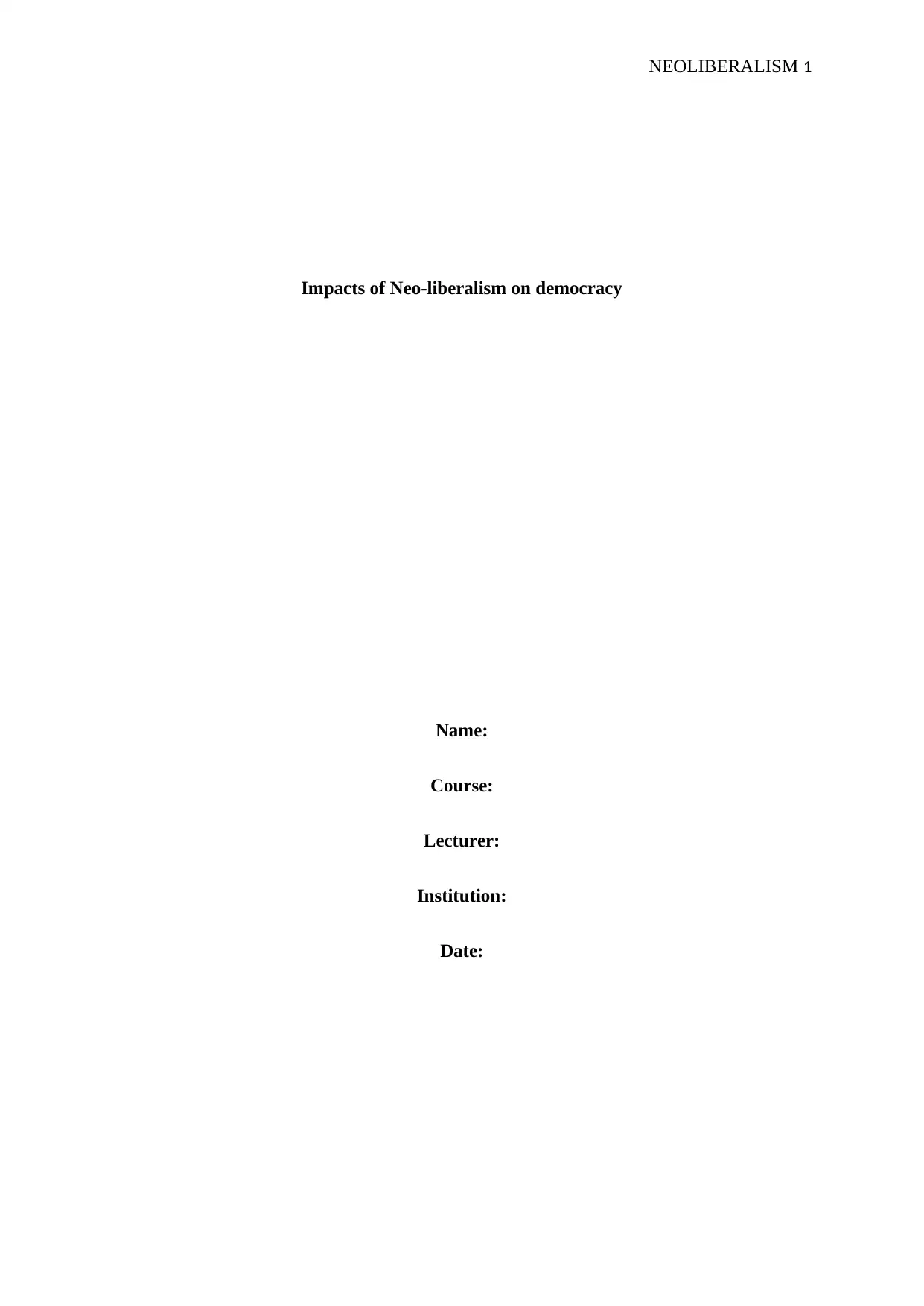
NEOLIBERALISM 1
Impacts of Neo-liberalism on democracy
Name:
Course:
Lecturer:
Institution:
Date:
Impacts of Neo-liberalism on democracy
Name:
Course:
Lecturer:
Institution:
Date:
Paraphrase This Document
Need a fresh take? Get an instant paraphrase of this document with our AI Paraphraser
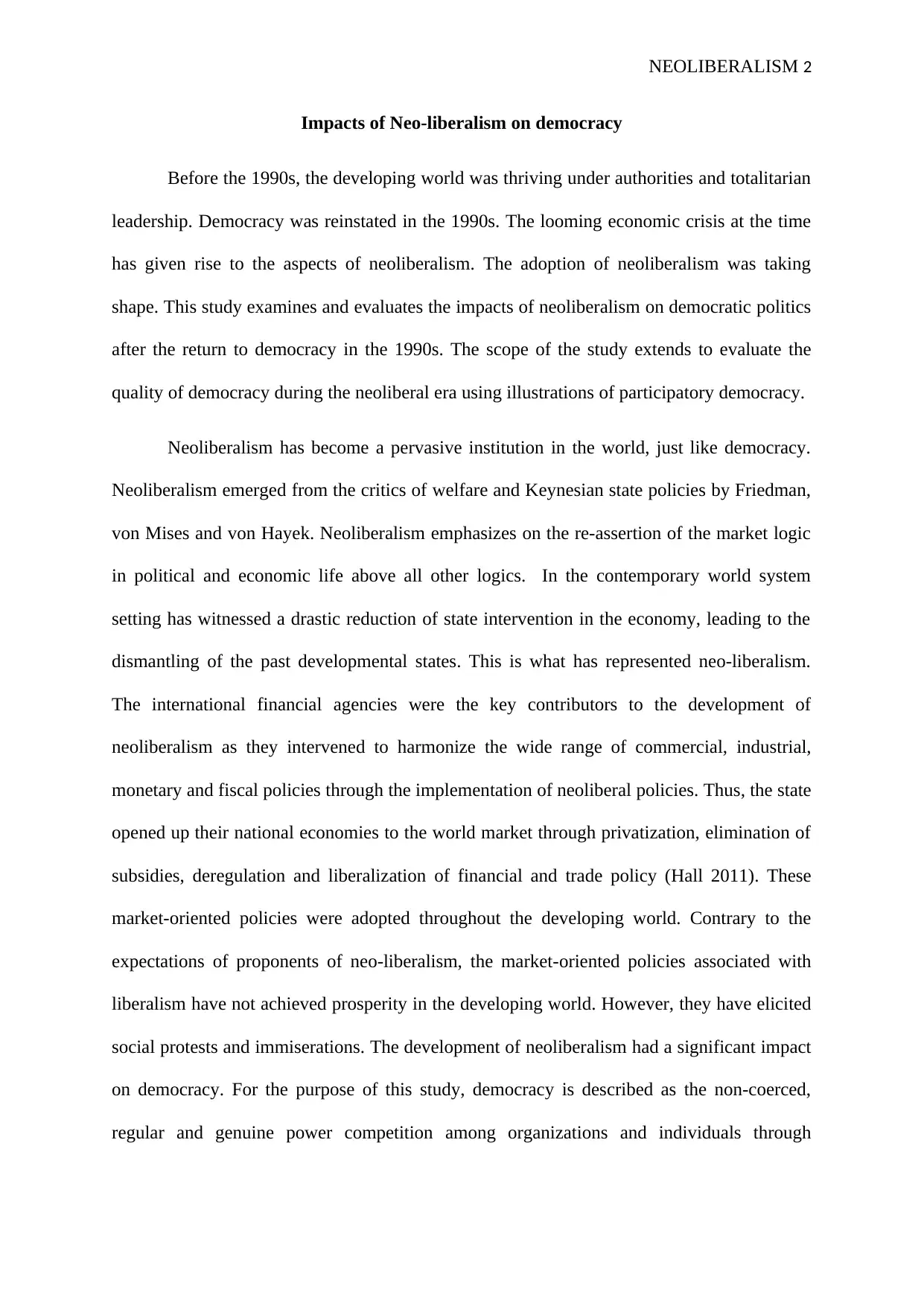
NEOLIBERALISM 2
Impacts of Neo-liberalism on democracy
Before the 1990s, the developing world was thriving under authorities and totalitarian
leadership. Democracy was reinstated in the 1990s. The looming economic crisis at the time
has given rise to the aspects of neoliberalism. The adoption of neoliberalism was taking
shape. This study examines and evaluates the impacts of neoliberalism on democratic politics
after the return to democracy in the 1990s. The scope of the study extends to evaluate the
quality of democracy during the neoliberal era using illustrations of participatory democracy.
Neoliberalism has become a pervasive institution in the world, just like democracy.
Neoliberalism emerged from the critics of welfare and Keynesian state policies by Friedman,
von Mises and von Hayek. Neoliberalism emphasizes on the re-assertion of the market logic
in political and economic life above all other logics. In the contemporary world system
setting has witnessed a drastic reduction of state intervention in the economy, leading to the
dismantling of the past developmental states. This is what has represented neo-liberalism.
The international financial agencies were the key contributors to the development of
neoliberalism as they intervened to harmonize the wide range of commercial, industrial,
monetary and fiscal policies through the implementation of neoliberal policies. Thus, the state
opened up their national economies to the world market through privatization, elimination of
subsidies, deregulation and liberalization of financial and trade policy (Hall 2011). These
market-oriented policies were adopted throughout the developing world. Contrary to the
expectations of proponents of neo-liberalism, the market-oriented policies associated with
liberalism have not achieved prosperity in the developing world. However, they have elicited
social protests and immiserations. The development of neoliberalism had a significant impact
on democracy. For the purpose of this study, democracy is described as the non-coerced,
regular and genuine power competition among organizations and individuals through
Impacts of Neo-liberalism on democracy
Before the 1990s, the developing world was thriving under authorities and totalitarian
leadership. Democracy was reinstated in the 1990s. The looming economic crisis at the time
has given rise to the aspects of neoliberalism. The adoption of neoliberalism was taking
shape. This study examines and evaluates the impacts of neoliberalism on democratic politics
after the return to democracy in the 1990s. The scope of the study extends to evaluate the
quality of democracy during the neoliberal era using illustrations of participatory democracy.
Neoliberalism has become a pervasive institution in the world, just like democracy.
Neoliberalism emerged from the critics of welfare and Keynesian state policies by Friedman,
von Mises and von Hayek. Neoliberalism emphasizes on the re-assertion of the market logic
in political and economic life above all other logics. In the contemporary world system
setting has witnessed a drastic reduction of state intervention in the economy, leading to the
dismantling of the past developmental states. This is what has represented neo-liberalism.
The international financial agencies were the key contributors to the development of
neoliberalism as they intervened to harmonize the wide range of commercial, industrial,
monetary and fiscal policies through the implementation of neoliberal policies. Thus, the state
opened up their national economies to the world market through privatization, elimination of
subsidies, deregulation and liberalization of financial and trade policy (Hall 2011). These
market-oriented policies were adopted throughout the developing world. Contrary to the
expectations of proponents of neo-liberalism, the market-oriented policies associated with
liberalism have not achieved prosperity in the developing world. However, they have elicited
social protests and immiserations. The development of neoliberalism had a significant impact
on democracy. For the purpose of this study, democracy is described as the non-coerced,
regular and genuine power competition among organizations and individuals through
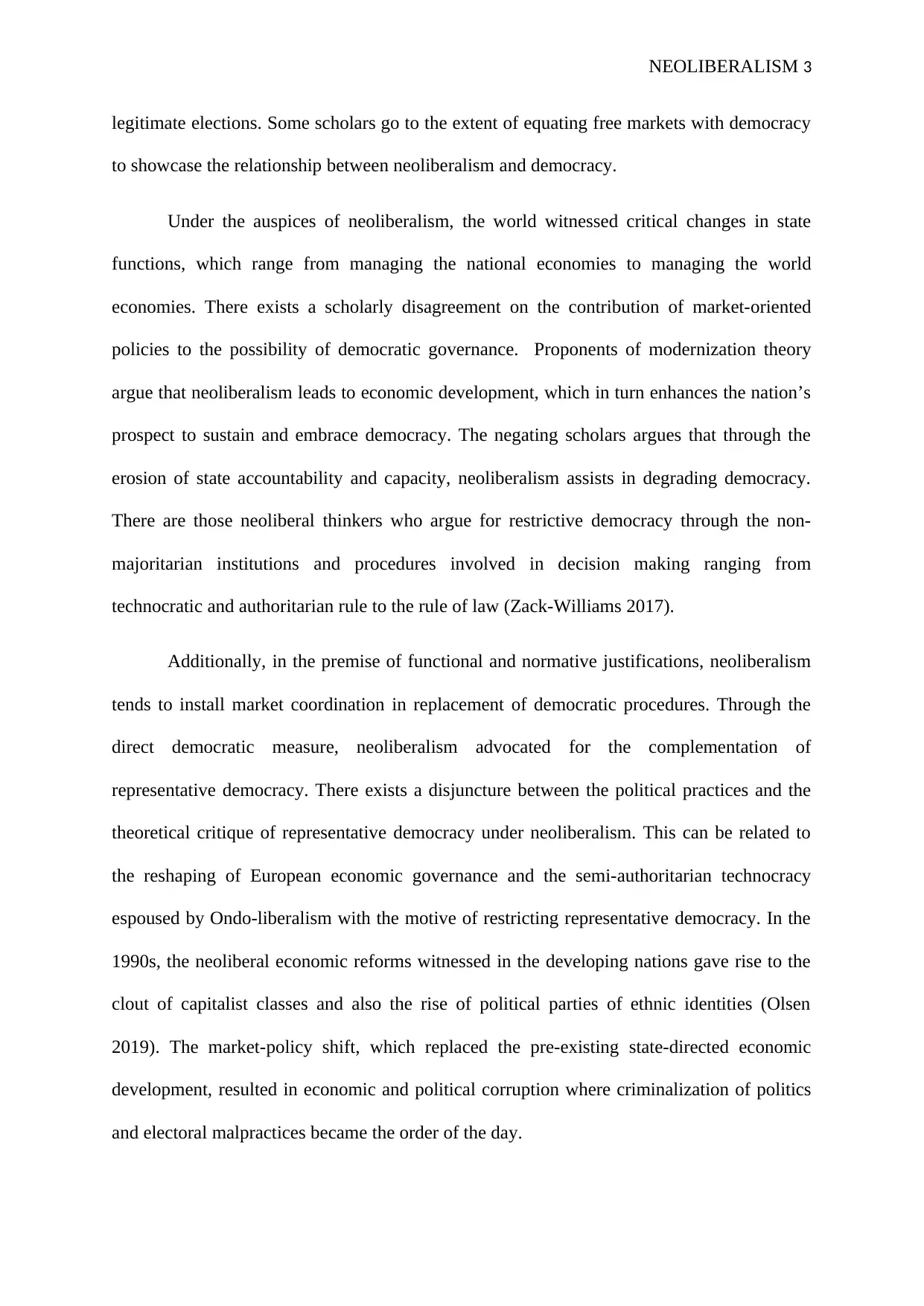
NEOLIBERALISM 3
legitimate elections. Some scholars go to the extent of equating free markets with democracy
to showcase the relationship between neoliberalism and democracy.
Under the auspices of neoliberalism, the world witnessed critical changes in state
functions, which range from managing the national economies to managing the world
economies. There exists a scholarly disagreement on the contribution of market-oriented
policies to the possibility of democratic governance. Proponents of modernization theory
argue that neoliberalism leads to economic development, which in turn enhances the nation’s
prospect to sustain and embrace democracy. The negating scholars argues that through the
erosion of state accountability and capacity, neoliberalism assists in degrading democracy.
There are those neoliberal thinkers who argue for restrictive democracy through the non-
majoritarian institutions and procedures involved in decision making ranging from
technocratic and authoritarian rule to the rule of law (Zack-Williams 2017).
Additionally, in the premise of functional and normative justifications, neoliberalism
tends to install market coordination in replacement of democratic procedures. Through the
direct democratic measure, neoliberalism advocated for the complementation of
representative democracy. There exists a disjuncture between the political practices and the
theoretical critique of representative democracy under neoliberalism. This can be related to
the reshaping of European economic governance and the semi-authoritarian technocracy
espoused by Ondo-liberalism with the motive of restricting representative democracy. In the
1990s, the neoliberal economic reforms witnessed in the developing nations gave rise to the
clout of capitalist classes and also the rise of political parties of ethnic identities (Olsen
2019). The market-policy shift, which replaced the pre-existing state-directed economic
development, resulted in economic and political corruption where criminalization of politics
and electoral malpractices became the order of the day.
legitimate elections. Some scholars go to the extent of equating free markets with democracy
to showcase the relationship between neoliberalism and democracy.
Under the auspices of neoliberalism, the world witnessed critical changes in state
functions, which range from managing the national economies to managing the world
economies. There exists a scholarly disagreement on the contribution of market-oriented
policies to the possibility of democratic governance. Proponents of modernization theory
argue that neoliberalism leads to economic development, which in turn enhances the nation’s
prospect to sustain and embrace democracy. The negating scholars argues that through the
erosion of state accountability and capacity, neoliberalism assists in degrading democracy.
There are those neoliberal thinkers who argue for restrictive democracy through the non-
majoritarian institutions and procedures involved in decision making ranging from
technocratic and authoritarian rule to the rule of law (Zack-Williams 2017).
Additionally, in the premise of functional and normative justifications, neoliberalism
tends to install market coordination in replacement of democratic procedures. Through the
direct democratic measure, neoliberalism advocated for the complementation of
representative democracy. There exists a disjuncture between the political practices and the
theoretical critique of representative democracy under neoliberalism. This can be related to
the reshaping of European economic governance and the semi-authoritarian technocracy
espoused by Ondo-liberalism with the motive of restricting representative democracy. In the
1990s, the neoliberal economic reforms witnessed in the developing nations gave rise to the
clout of capitalist classes and also the rise of political parties of ethnic identities (Olsen
2019). The market-policy shift, which replaced the pre-existing state-directed economic
development, resulted in economic and political corruption where criminalization of politics
and electoral malpractices became the order of the day.
⊘ This is a preview!⊘
Do you want full access?
Subscribe today to unlock all pages.

Trusted by 1+ million students worldwide
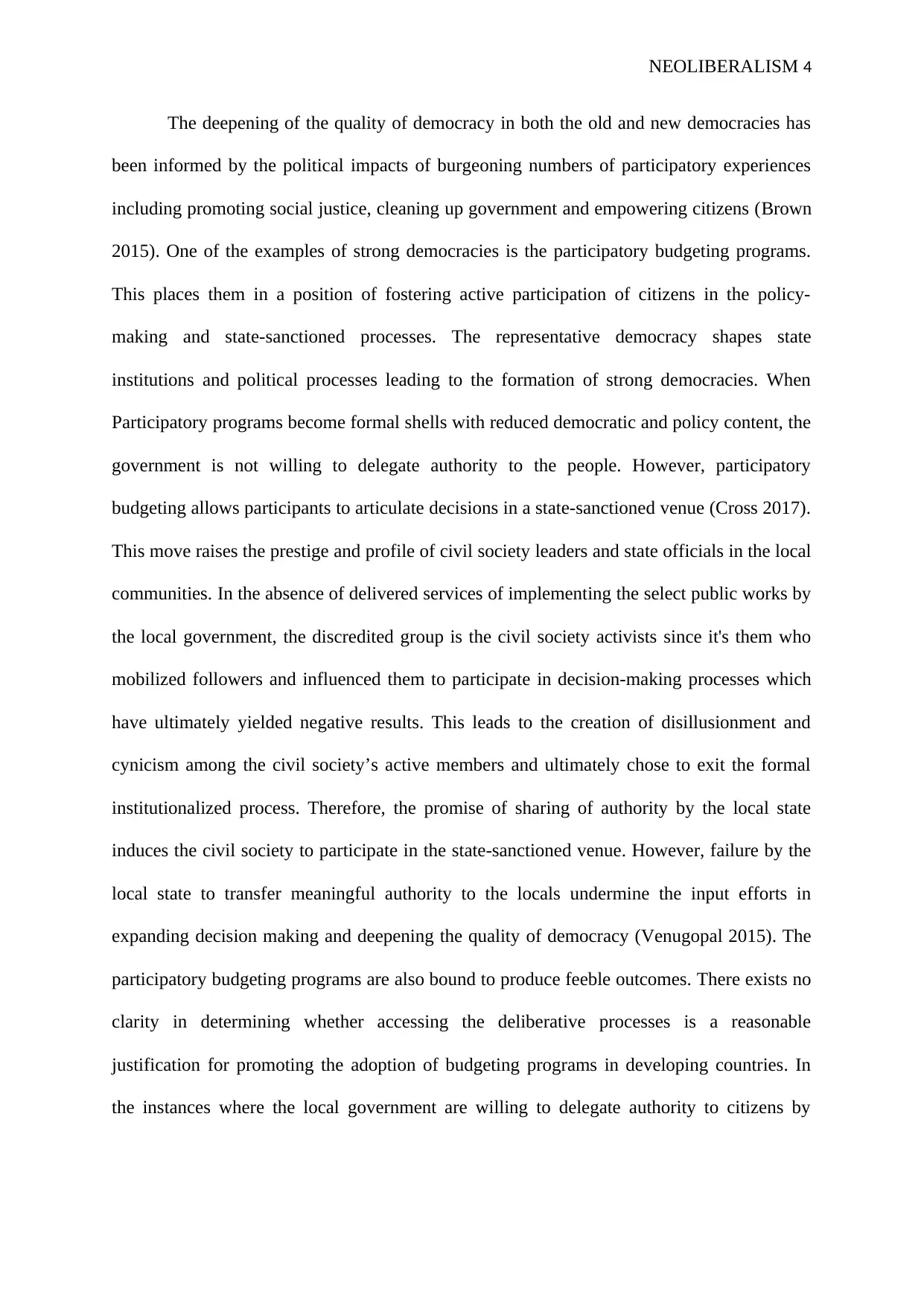
NEOLIBERALISM 4
The deepening of the quality of democracy in both the old and new democracies has
been informed by the political impacts of burgeoning numbers of participatory experiences
including promoting social justice, cleaning up government and empowering citizens (Brown
2015). One of the examples of strong democracies is the participatory budgeting programs.
This places them in a position of fostering active participation of citizens in the policy-
making and state-sanctioned processes. The representative democracy shapes state
institutions and political processes leading to the formation of strong democracies. When
Participatory programs become formal shells with reduced democratic and policy content, the
government is not willing to delegate authority to the people. However, participatory
budgeting allows participants to articulate decisions in a state-sanctioned venue (Cross 2017).
This move raises the prestige and profile of civil society leaders and state officials in the local
communities. In the absence of delivered services of implementing the select public works by
the local government, the discredited group is the civil society activists since it's them who
mobilized followers and influenced them to participate in decision-making processes which
have ultimately yielded negative results. This leads to the creation of disillusionment and
cynicism among the civil society’s active members and ultimately chose to exit the formal
institutionalized process. Therefore, the promise of sharing of authority by the local state
induces the civil society to participate in the state-sanctioned venue. However, failure by the
local state to transfer meaningful authority to the locals undermine the input efforts in
expanding decision making and deepening the quality of democracy (Venugopal 2015). The
participatory budgeting programs are also bound to produce feeble outcomes. There exists no
clarity in determining whether accessing the deliberative processes is a reasonable
justification for promoting the adoption of budgeting programs in developing countries. In
the instances where the local government are willing to delegate authority to citizens by
The deepening of the quality of democracy in both the old and new democracies has
been informed by the political impacts of burgeoning numbers of participatory experiences
including promoting social justice, cleaning up government and empowering citizens (Brown
2015). One of the examples of strong democracies is the participatory budgeting programs.
This places them in a position of fostering active participation of citizens in the policy-
making and state-sanctioned processes. The representative democracy shapes state
institutions and political processes leading to the formation of strong democracies. When
Participatory programs become formal shells with reduced democratic and policy content, the
government is not willing to delegate authority to the people. However, participatory
budgeting allows participants to articulate decisions in a state-sanctioned venue (Cross 2017).
This move raises the prestige and profile of civil society leaders and state officials in the local
communities. In the absence of delivered services of implementing the select public works by
the local government, the discredited group is the civil society activists since it's them who
mobilized followers and influenced them to participate in decision-making processes which
have ultimately yielded negative results. This leads to the creation of disillusionment and
cynicism among the civil society’s active members and ultimately chose to exit the formal
institutionalized process. Therefore, the promise of sharing of authority by the local state
induces the civil society to participate in the state-sanctioned venue. However, failure by the
local state to transfer meaningful authority to the locals undermine the input efforts in
expanding decision making and deepening the quality of democracy (Venugopal 2015). The
participatory budgeting programs are also bound to produce feeble outcomes. There exists no
clarity in determining whether accessing the deliberative processes is a reasonable
justification for promoting the adoption of budgeting programs in developing countries. In
the instances where the local government are willing to delegate authority to citizens by
Paraphrase This Document
Need a fresh take? Get an instant paraphrase of this document with our AI Paraphraser
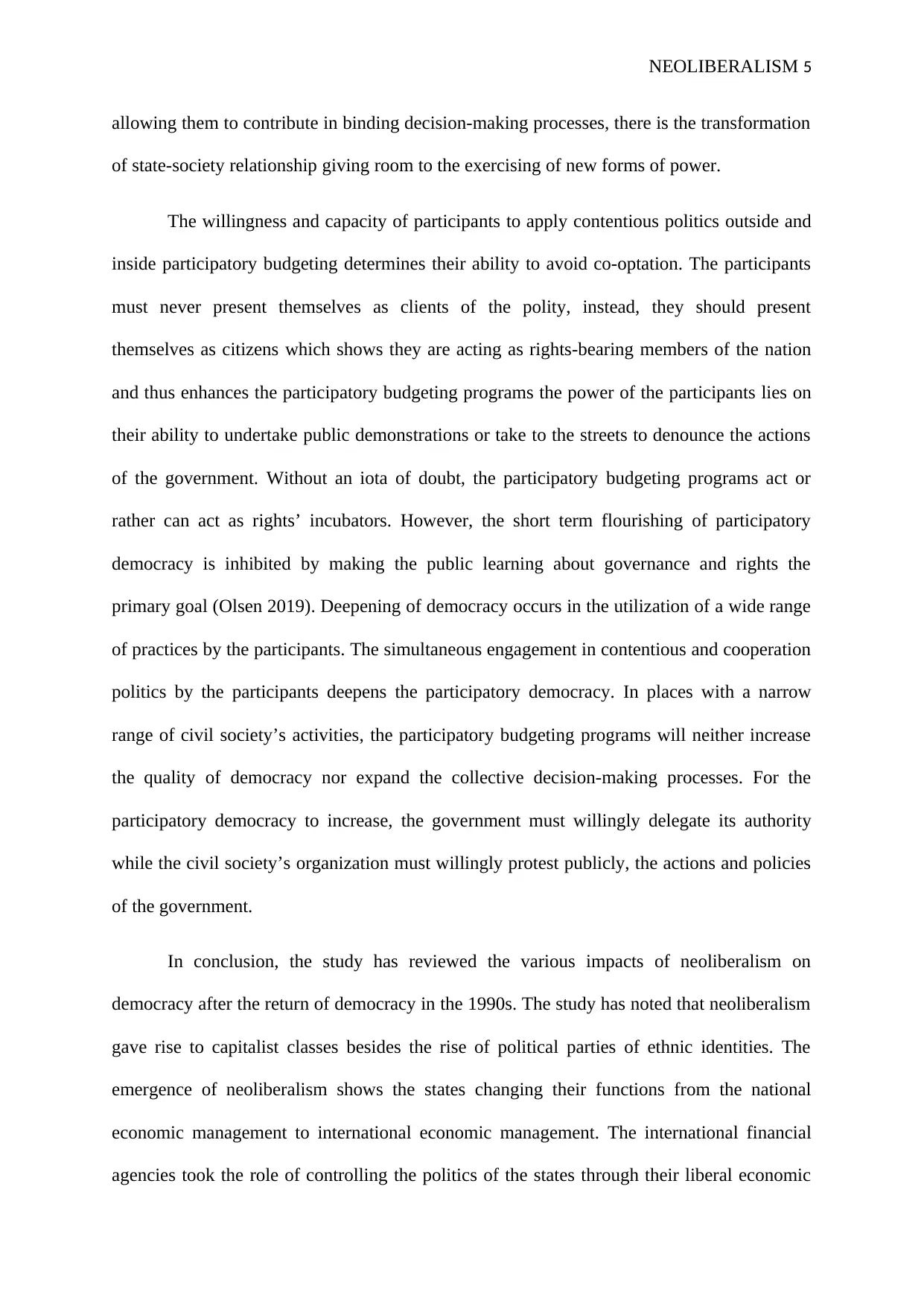
NEOLIBERALISM 5
allowing them to contribute in binding decision-making processes, there is the transformation
of state-society relationship giving room to the exercising of new forms of power.
The willingness and capacity of participants to apply contentious politics outside and
inside participatory budgeting determines their ability to avoid co-optation. The participants
must never present themselves as clients of the polity, instead, they should present
themselves as citizens which shows they are acting as rights-bearing members of the nation
and thus enhances the participatory budgeting programs the power of the participants lies on
their ability to undertake public demonstrations or take to the streets to denounce the actions
of the government. Without an iota of doubt, the participatory budgeting programs act or
rather can act as rights’ incubators. However, the short term flourishing of participatory
democracy is inhibited by making the public learning about governance and rights the
primary goal (Olsen 2019). Deepening of democracy occurs in the utilization of a wide range
of practices by the participants. The simultaneous engagement in contentious and cooperation
politics by the participants deepens the participatory democracy. In places with a narrow
range of civil society’s activities, the participatory budgeting programs will neither increase
the quality of democracy nor expand the collective decision-making processes. For the
participatory democracy to increase, the government must willingly delegate its authority
while the civil society’s organization must willingly protest publicly, the actions and policies
of the government.
In conclusion, the study has reviewed the various impacts of neoliberalism on
democracy after the return of democracy in the 1990s. The study has noted that neoliberalism
gave rise to capitalist classes besides the rise of political parties of ethnic identities. The
emergence of neoliberalism shows the states changing their functions from the national
economic management to international economic management. The international financial
agencies took the role of controlling the politics of the states through their liberal economic
allowing them to contribute in binding decision-making processes, there is the transformation
of state-society relationship giving room to the exercising of new forms of power.
The willingness and capacity of participants to apply contentious politics outside and
inside participatory budgeting determines their ability to avoid co-optation. The participants
must never present themselves as clients of the polity, instead, they should present
themselves as citizens which shows they are acting as rights-bearing members of the nation
and thus enhances the participatory budgeting programs the power of the participants lies on
their ability to undertake public demonstrations or take to the streets to denounce the actions
of the government. Without an iota of doubt, the participatory budgeting programs act or
rather can act as rights’ incubators. However, the short term flourishing of participatory
democracy is inhibited by making the public learning about governance and rights the
primary goal (Olsen 2019). Deepening of democracy occurs in the utilization of a wide range
of practices by the participants. The simultaneous engagement in contentious and cooperation
politics by the participants deepens the participatory democracy. In places with a narrow
range of civil society’s activities, the participatory budgeting programs will neither increase
the quality of democracy nor expand the collective decision-making processes. For the
participatory democracy to increase, the government must willingly delegate its authority
while the civil society’s organization must willingly protest publicly, the actions and policies
of the government.
In conclusion, the study has reviewed the various impacts of neoliberalism on
democracy after the return of democracy in the 1990s. The study has noted that neoliberalism
gave rise to capitalist classes besides the rise of political parties of ethnic identities. The
emergence of neoliberalism shows the states changing their functions from the national
economic management to international economic management. The international financial
agencies took the role of controlling the politics of the states through their liberal economic
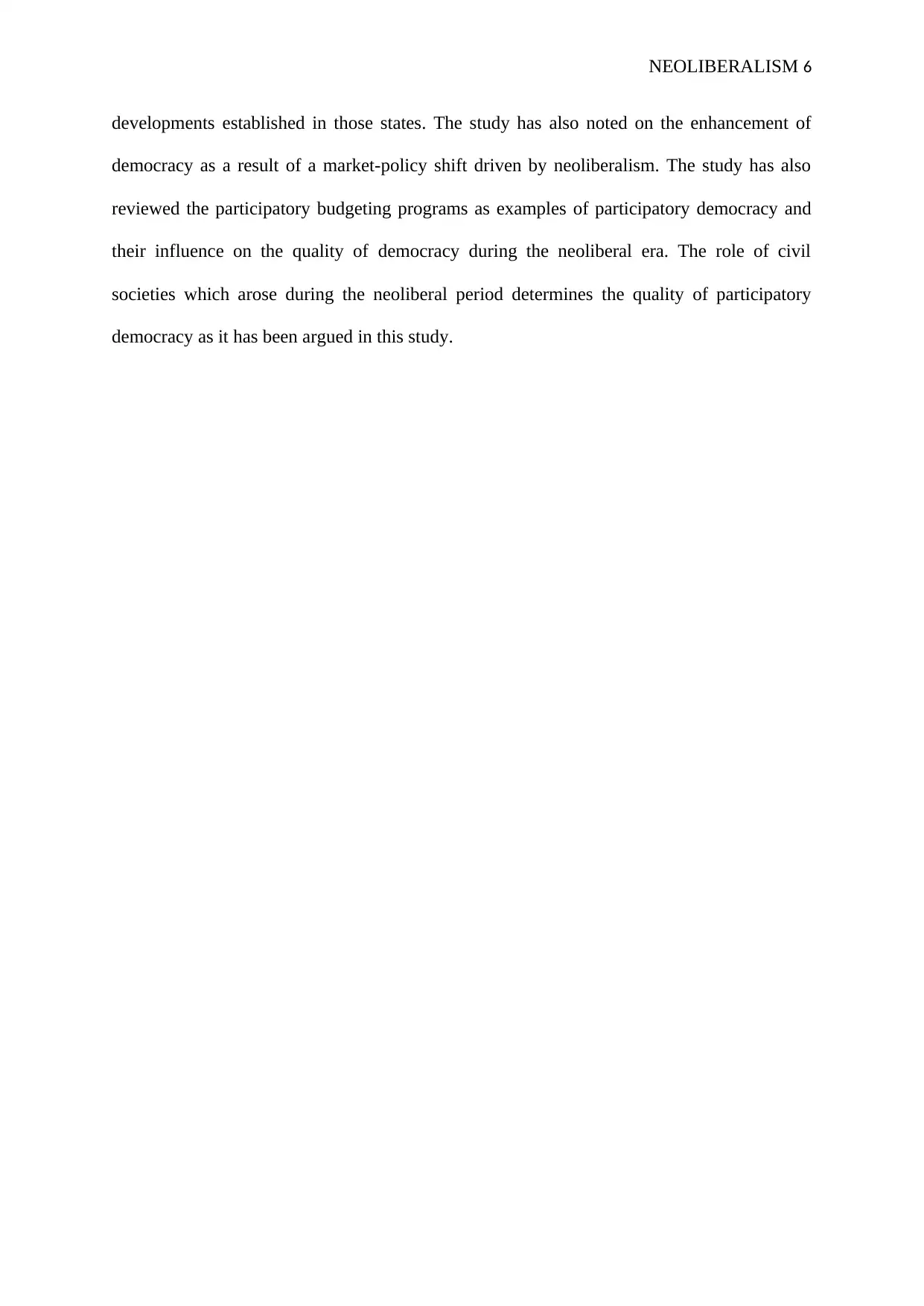
NEOLIBERALISM 6
developments established in those states. The study has also noted on the enhancement of
democracy as a result of a market-policy shift driven by neoliberalism. The study has also
reviewed the participatory budgeting programs as examples of participatory democracy and
their influence on the quality of democracy during the neoliberal era. The role of civil
societies which arose during the neoliberal period determines the quality of participatory
democracy as it has been argued in this study.
developments established in those states. The study has also noted on the enhancement of
democracy as a result of a market-policy shift driven by neoliberalism. The study has also
reviewed the participatory budgeting programs as examples of participatory democracy and
their influence on the quality of democracy during the neoliberal era. The role of civil
societies which arose during the neoliberal period determines the quality of participatory
democracy as it has been argued in this study.
⊘ This is a preview!⊘
Do you want full access?
Subscribe today to unlock all pages.

Trusted by 1+ million students worldwide
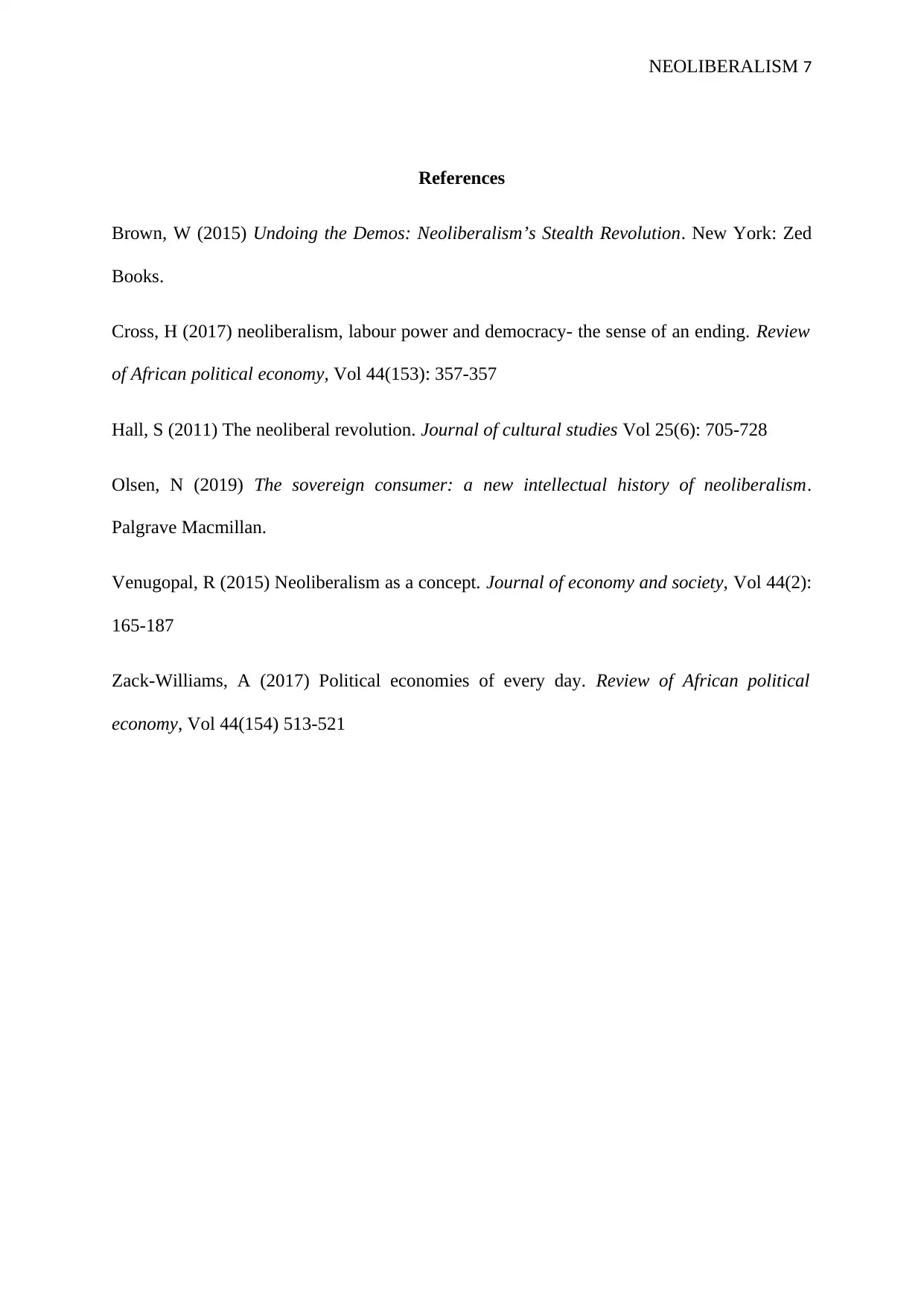
NEOLIBERALISM 7
References
Brown, W (2015) Undoing the Demos: Neoliberalism’s Stealth Revolution. New York: Zed
Books.
Cross, H (2017) neoliberalism, labour power and democracy- the sense of an ending. Review
of African political economy, Vol 44(153): 357-357
Hall, S (2011) The neoliberal revolution. Journal of cultural studies Vol 25(6): 705-728
Olsen, N (2019) The sovereign consumer: a new intellectual history of neoliberalism.
Palgrave Macmillan.
Venugopal, R (2015) Neoliberalism as a concept. Journal of economy and society, Vol 44(2):
165-187
Zack-Williams, A (2017) Political economies of every day. Review of African political
economy, Vol 44(154) 513-521
References
Brown, W (2015) Undoing the Demos: Neoliberalism’s Stealth Revolution. New York: Zed
Books.
Cross, H (2017) neoliberalism, labour power and democracy- the sense of an ending. Review
of African political economy, Vol 44(153): 357-357
Hall, S (2011) The neoliberal revolution. Journal of cultural studies Vol 25(6): 705-728
Olsen, N (2019) The sovereign consumer: a new intellectual history of neoliberalism.
Palgrave Macmillan.
Venugopal, R (2015) Neoliberalism as a concept. Journal of economy and society, Vol 44(2):
165-187
Zack-Williams, A (2017) Political economies of every day. Review of African political
economy, Vol 44(154) 513-521
1 out of 7
Related Documents
Your All-in-One AI-Powered Toolkit for Academic Success.
+13062052269
info@desklib.com
Available 24*7 on WhatsApp / Email
![[object Object]](/_next/static/media/star-bottom.7253800d.svg)
Unlock your academic potential
Copyright © 2020–2026 A2Z Services. All Rights Reserved. Developed and managed by ZUCOL.




